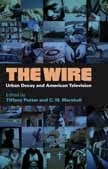
When We Tap “The Wire”
A RESPONSE TO "OBAMA IN THE AGE OF THE WIRE"
THE HARVARD PROJECT
by Afaa Michael Weaver
The Wire/Urban Decay and American Television edited by Tiffany Potter and C.W. Marshall is the first published collection of critical essays on the HBO program “The Wire.” The book includes an essay of mine entitled “Baltimore Before the Wire.” What follows here is my response to the project at Harvard University.
In The Wire Collington Square Park is used to portray Marlo, an ambitious young drug dealer, in meetings with his guards and assassins. They stand on a knoll where Johns Hopkins hospital stands in the background. I know the park as the one adjacent to the school where my son and two youngest siblings attended the Head Start program in the seventies. As a poet who did his literary apprenticeship as a Baltimore factory worker, my life has taken me across the spectrum of the city covered in this television series that has garnered the attention of Harvard educators and community leaders and activists in Boston’s black community. It has also gathered its share of controversy. I think Reverend Rivers and his colleagues at Harvard have rightfully claimed the program as a teaching tool, and I understand the concerns of Ishmael Reed, whom I know and whose work I have always appreciated, just as he has explained in conversation that he appreciates mine.
However, Reed is no fan of The Wire and has said it is full of cliches. My concerns go to both sides of this controversy.
As to the matter of cliches, I would go so far as to say the characters in The Wire are perhaps the catalytic summation and potential antidote to the cliches Reed cites. Simon’s characters are rooted in the active space in the consciousness of lived experience. Granted, European tourists cruising the city looking for action is not something I find comforting. As a native son of Baltimore, I believe the folks at Harvard could have strengthened their offering to the students there and to the black community had they sought more input from folks who actually grew up in Baltimore. There are a few of us in the Boston area.
My family home is on Federal Street in East Baltimore, a few blocks away from the rim shop that is used in The Wire as a meeting place for drug dealers. Four blocks from my parents’ home is the intersection of Federal Street and Milton Avenue, the northern end of a stretch that is a major artery in what we call “street life.” In the late fifties my parents obtained a mortgage during the period of block busting when rental agents across the country were making fortunes by using scare tactics to move white owners out and resell to blacks at inflated prices. Milton Avenue had a five and dime and a movie theater that were destroyed in the riots following Dr. King’s assassination. As heroin and then crack flooded our neighborhood immediately after the sixties, Milton Avenue fell apart and down to what it is now, a no man’s land in the world of illegal drugs and poverty.
I know and have known people whose lives and personalities fit aspects of the characters in The Wire, and each time I watch the program I see them anew, in dimensions that speak honestly to their intelligence and own sense of integrity, as poorly constructed and misshapen as they might be in real life when human failings meet systemic social dysfunction and deliberate plans for destroying a community.
In applying The Wire to Boston I would expect these educators and activists to know Boston is not Baltimore. The black community here is not the more “like member” kind of community in Baltimore, where black folks from the same areas in Virginia, the Carolinas, and Georgia and elsewhere in the South moved in groups to the same neighborhoods in Baltimore. Boston is one of the America’s internationally black cities where you do not have to go too far back in the family to know someone who speaks or spoke Jamaican patois or Haitian creole. Boston is a city with a black diversity that is something of a marvel but a mystery to many whites and an untapped discussion for many black folks. However, it is another marker of significant difference in applying The Wire to Boston, a very northern city.
Still The Wire should be applied. It should be applied to our collective consciousness as a well-told tale of what has happened to one of America’s great cities, a tale where the historic trends and development, the tragic flow of its hustle, invites us all to be more human.
____________________________________________________________________________


Comments